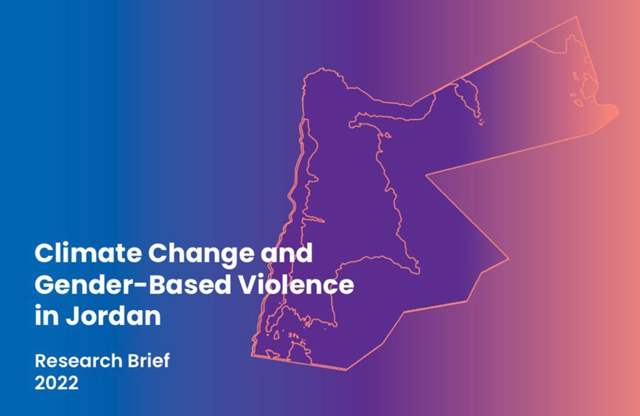AMMAN — A recent research has showed that the imbalance in power relations and roles resulting from patriarchy in the context of climate change diminishes the ability of women and girls to adapt to and recover from climate-related events.
Launched by the United Nations Population Fund (UNFPA) Jordan in collaboration with the Information and Research Centre – King Hussein Foundation and Sama Consulting, this research brief aims to highlight the impact of climate change on women and girls in Jordan with a particular focus on gender-based violence (GBV).
The research also focuses on the contribution of women and girls in Jordan who are leading the charge on climate change adaptation, mitigation and response to build a more sustainable future.
According to the research, climate-induced displacement amplifies pre-existing vulnerabilities to GBV, intimate partner violence and sexual violence. Additionally, climate change significantly increases the risk of child marriage.
“Climate hazards in Jordan have been increasing in frequency and intensity over the past decade”, the research noted, adding that “adaptation planning with defined options and measures is required to mitigate its effects and build resilient communities and ecosystems.”
It indicated that one of the most pressing issues facing Jordan is water scarcity, which climate change is already manifested in. Additionally, higher average temperatures, changes in precipitation and temperature extremes are projected to impact the availability and quality of water resources, which eventually impacts women and girls the most.
In a statement shared by the research, Eco Consult CEO Raed Daoud said: “Over the past 40 years, we have lost around 20 per cent of our annual rainfall. What this does is reduce the recharge rates of groundwater, impacting its availability and quality.”
Daoud added that in the past the majority of food used to come from rainfed agriculture and “now we need to irrigate for longer periods and with higher quantities of water.”
One of the things that makes women and girls more vulnerable to climate change is their dependence on threatened natural resources, the report said.
Among the main factors making women suffer the most from climate change in Jordan is inequitable water supply which leads to increased tensions between family members and intimate partner violence, and reversely impacts them during their menstrual cycle, according to the research.
This made it clear that women living in poverty and female-headed households in Jordan are more likely to suffer from lack of resources and less means to cope, the report added.
“The gender paradigm in Jordan places a higher value on women’s reproductive roles which become more stressful with the scarcity of resources,” the research brief said.
The brief pointed out that women in Jordan are not effectively included in climate change discussions and policy formulation. However, there are several grassroot initiatives founded or co-founded by Jordanian women with the aim of contributing to environmental sustainability and climate action efforts.
Furthermore, the brief recommended to produce sex-disaggregated data in the field of environment and climate change, particularly data on the impacts of climate change in Jordan. This will collect and collate evidence on the links between climate change hazards and GBV and highlight women’s contributions at the policy and community levels.
